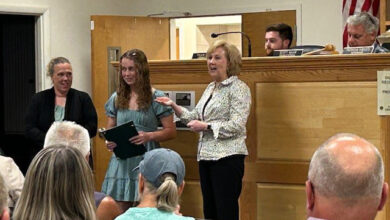Tax exemption proposed for Brockport Canalside building

The Greater Brockport Development Corporation (GBDC) is seeking a tax exemption from the Town of Sweden and the Brockport Central School District to assist with the sale and development of the long vacant 60 Clinton Street in the Village of Brockport.
Bill Andrews, Brockport deputy mayor and GBDC Board of Directors member, met recently with members of the Sweden Town Board during a workshop session October 15. He is requesting that the town adopt a local law applying New York State Real Property Tax Law 421m which the village has already done regarding 60 Clinton Street.
The property has been owned by the GBDC for about six years and the corporation has spent $45,000 on environmental clean-up, repairs, general maintenance and stabilizing the structure, Andrews says.
Town officials say the Board of Trustees would need to schedule a public hearing before adopting the exemption and some in the community have voiced concerns over the exemption and the burden it might place on taxpayers as well as the criteria regarding other properties which might receive the exemption.
Sweden Town Assessor Tony Eaffaldano explained how the exemption would work. The building would go on the tax rolls at its assessed value (Andrews says that is $64,000). Any improvements on the building as part of the rehabilitation/restoration would be 100 percent tax exempt for 12 years.
The state law states that the 100 percent exemption would also apply during construction or substantial rehabilitation work – for up to three years, meaning the first 15 years from the sale of the building could be 100 percent exempt, Eaffaldano says. From years 13-20 the exemption goes down by 20 percent every two years until it is phased out.
“Sweden town taxpayers need to be asked – do they want to pay this group’s taxes for 20 years?” Eaffaldano says.
He explains that he welcomes development in the town but would like to see that work completed within the means of the property owner.
During the regular meeting of the Sweden Town Board October 8, resident Rhett King addressed the board voicing his opposition to the exemption.
King told the Suburban News and Hamlin-Clarkson Herald that with almost 50 percent of the properties in Sweden already getting an exemption, “how much more burden should the residents be asked to shoulder?” He also questioned why a developer who doesn’t live in the community benefits while, “those of us who do live here pay more in taxes because another property becomes tax exempt.”
He said he feels the exemption puts other struggling businesses in the community at a disadvantage, and that “there are other areas that may be more deserving of exemptions to encourage development. High Street, Fair Street and Lyman Street are run-down areas in need of help. Why is one special interest group favored over the greater community ?”
The exemption would also set a precedent, King said. “With almost 70 percent of properties in the village getting a tax break and almost 50 percent in the greater Town of Sweden, we are already shouldering the burden of deserving properties.”
Bill Andrews says this exemption differs from ones that the college and school district receive or exemptions such as STAR.
“There is no way to lose tax money because of this,” Andrews says. He adds that the GBDC is not a special interest group but a public benefit and local development corporation which provides, “public benefits that municipalities cannot, by state law, provide.”
Andrews says well-known developer Greg O’Connell – who purchased 20 buildings in downtown Mt. Morris and is credited with turning the business district there around – is interested in purchasing 60 Clinton Street and that if the exemption is adopted by the town and school district, he will complete the purchase of the property. Restoration/rehabilitation work could begin immediately, Andrews says.
Andrews says that when the local law regarding the exemption is enacted, 60 Clinton Street will go on the tax rolls and eventually produce 10 times or more the present tax liability.
Three family apartments are planned for the site as well as a restaurant to be operated by the BASC at the college.
The exemption would also be a first step in implementing the Clinton Street Master Plan which is part of the Sweden/Brockport Comprehensive Plan, Andrews says.
And, 60 Clinton Street has historical significance, he notes, and is on the state and national registers of historic places. It dates to 1850 and was originally used as a farm implement factory.
As part of the 1999 Canal Front Master Plan, the property was seen as the “anchor of a shopping district,” Andrews says. “The building is the key to redevelopment of the area and would act as a catalyst – other good things could happen.”
Andrews says town officials may have expressed concerns early on because the state law does not detail an approval process for the exemption.
He has drafted what the local law could look like and it gives the town control over access to the exemption – each application would have to be approved by the Town Board.
“The law is based on what the village adopted,” Andrews says. “As long as it doesn’t contradict the state law, we can put in the local law whatever we want.”
Town officials say board members would like to meet with their attorney before making any decisions about whether or not to move forward with the proposal.
Photo by Kristina Gabalski
10/27/13




